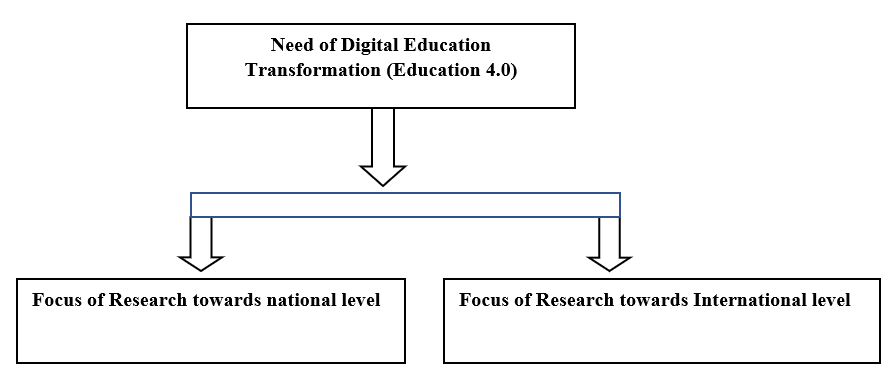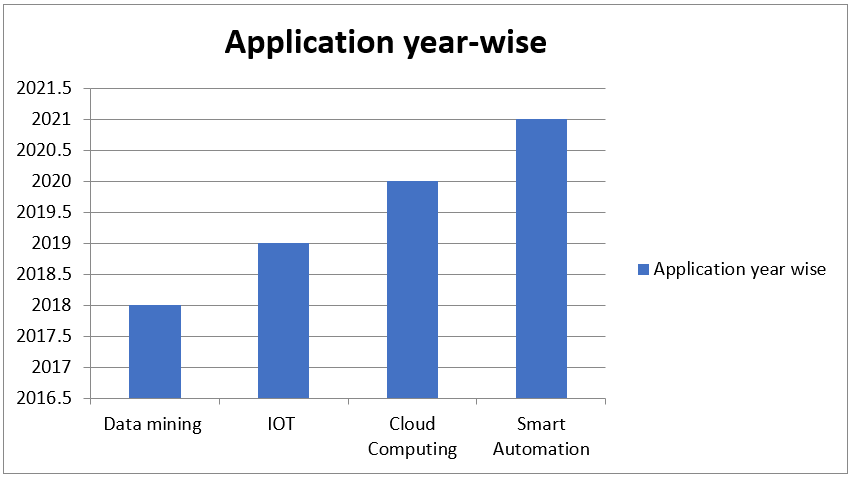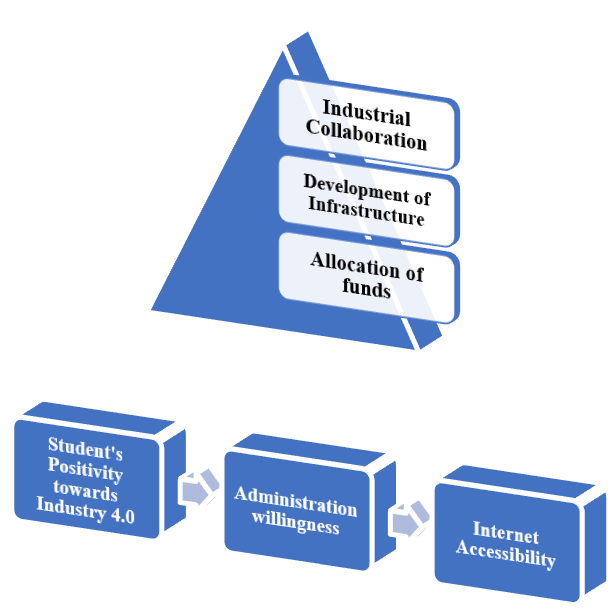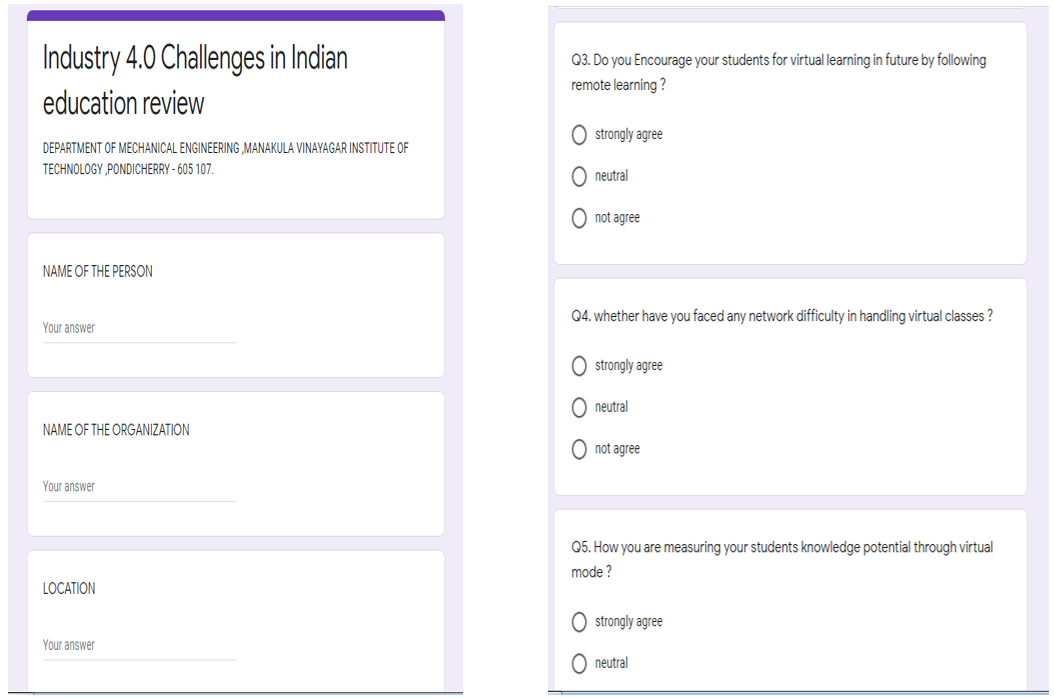INDUSTRY 4.0 CHALLENGES AND IMPLEMENTATION IN EDUCATION SECTOR IN INDIA
Abstract
Today’s education system has brought much advancement in using digital tools to reach the students learning and understanding in simple method of representation. In this global pandemic situation, most of the educational institutions all around the globe have switched over to digital mode of operation that is remote based learning approach. In conventional system of education, students have faced lot of pressures in listening to the normal mode of class room teaching during direct interaction, but online or remote based education learning has given some pace and flexibility to visualize the concepts as well as process much better than normal black board teaching style. Through digital mode, we can able to improve much better in presenting the concepts through video simulation in lesser time span, where as in old or traditional method of education, teacher has to put more effort in teaching the concepts to students. But today’s students are less attentive in nature. They can only able to see visually through graphics only, because that kind of education students prefer. In this paper, an attempt has been made to conduct survey through forms by collecting opinions from various respondents within the educational institutes in India. Based on the responses, business framework model is developed to implement in the real system.
Keywords
Industry 40, Education, Digital Mode, Business Model
INTRODUCTION
Modern technological advancements like Sensors, IOT (Internet of Things) and smart automation have influenced the present education system in several ways. Today’s education systems highly focused towards the digital flat form through virtual communication systems. In India, still there are some problems with the internet protocol or communication systems, lack of skilled persons, poor economic culture, etc. These are the issues present in the Indian education system. Industry Revolution 4.0 will definitely create a big impact on the Indian education system that will transform the future of advanced technology through visual method. The present system is not much beneficial to the students of Indian nation still students are following the olden method of education that is memorizing the concepts. In future, such type of conventional education pattern will not be going to help students. Today Digital method of education has brought many comfort and flexibilities to the students. This has increased the remote based learning through mobiles and laptops with increased bandwidth, but still in India from technology point of view, people from rural villages facing lot of connectivity issues and bandwidth problems during the past few months in the pandemic crisis. Before going for any change or transformation in the education process, first we have to fix the mind for preparedness, which is common for all individuals.
Then the next challenge is the preparedness for updating the skill in learning the new embedded technologies and then at last economic challenge is the vital thing, which is to be taken with more importance. Creativity is the main aspect in industrial revolution 4.0. Only trained and skilled peoples can be able to control the innovation and process mechanism in education system. According to Education 4.0, students need to be trained not by conventional teaching. This is the aim of remote based education system. Both Education 4.0 & Industry 4.0 must be aligned together in order to create job opportunities in more demand. The future education system will be more transparent in nature, in which all the information will be stored in the form of cloud. So, the user can able to access the information from the cloud data according to their wish.
Education 4.0 improves the freedom of learning and also freedom to innovate, think and implement by proving promising results in any fields. So, both students and educationalists have equal responsibility to sharpen the world by bringing quick changes through major advancements in the field. Education 4.0 brings many job opportunities to students in line with latest technological tools like Machine learning, Deep learning and Data science, etc. Education 4.0 will bring the change in the curriculum design and pedagogical methods practiced in teaching and learning process. Education 4.0 will have increased advantage in digital skills and Science, Technology, Engineering & Mathematics. As stated by Lloyds Bank in 2019 nearly 22% of the people in UK are lacking in digital proficiency that is considered to be more essential in order to do the day-to-day professional activities.
Also, in future it was estimated that AI (Artificial Intelligence) will have a profound role to play in the field of higher education and also to what extent the all universities will be converted to have smart campus in improving the teaching and learning quality. Education 4.0 requires a new strategy to prepare human resources in order to compete in the digital technology. The fourth Industrial revolution has shown impact in many several ways specifically in education sectors. The influence of industry 4.0 concept has brought more advanced transformations both in National and International level.
Both researchers and industrialists can work in cooperative manner to find solutions for many issues in the digital world of education. Education 4.0 does not require a teacher to teach the concepts in education institutions, instead remote based learning system is followed. Whereas the role of teachers will have slight change in the environment of Education 4.0. The new paradigm shift in Education 4.0 – Digital era will motivate to have a greater number of online courses for the students to enhance their skills through virtual mode of education. Similarly, teachers will also develop the core competencies towards teaching and learning through various ICT tools for simplified method of teaching and learning process. Even though education 4.0 has many advantages, at the same time readiness to accept for change is said to be one of the main challenges in the modern system. So, Education 4.0 must set its objectives in line with the goals of Industry 4.0 so that both educational institutions and Industries can work together for the betterment of student’s future.
LITERATURE REVIEW
In this section, a detailed review of literature is carried out to focus on the need and importance of Education 4.0, both in National and International levels. The focus of vision towards education is shown in Figure 1 .

REVIEW OF EDUCATION 4 0 TOWARDS NATIONAL LEVEL
(Sharma, 2019) have focused towards the transformation in education system in the era of fourth Industrial revolution (Industry 4.0). Use of emerging Technologies like AI (Artificial Intelligence), Smart automation, etc. has increased the high demand in education sectors in the recent times. The present education system is planned to shift towards virtual mode by training the students as well as staffs to work in man/machine interface system using smart robotics. Before going for the shift in the education system, it requires recent updates of technologies from students’ side and also from the faculty side. Education 4.0 aims for cooperative teaching and learning process through online (virtual classroom). (Tandon & Tandon, 2020) have studied the basic literature information about Education 4.0 based on their observation. It is known from the fact that the present 21st century needs a lot of skills and talents from the young engineers, who are graduating every year from the leading technical universities. Also, the authors have stated that the activities of human intervention will be gradually replaced by smart automation control system. In the present advancement of Industry 4.0, all the schools and colleges have to relook their education standards in teaching and learning process through creating massive job requirements by upgrading the skills of students from the school level onwards.
(Kb & Avinash, 2019) have described the need of Education 4.0 – Digital transformation. In India, the importance of Education 4.0 is still said to be dream concept. In future, it may come very rapidly to Indian education sectors. Education 4.0 is preparing the students for the future leadership. People from India still have the hesitation to change towards the modern advancements in future. India has different geographical locations and the people are separated by languages, various cultures, etc. First of all, people must have proper intensive training towards the modern transformation in education systems. Since, the students from rural background will have some difficulties in using the digital platform effectively, enough care to be taken to groom the rural people for education 4.0. (Hariharasudan & Kot, 2018) ha ve collected the basic data about languages that are used to communicate the medium in digital representation. In this paper, they reviewed the literature about digital English and its significant importance in education 4.0. Based on the comprehensive review, it is observed that most of the literature works are done in Digital English in the past. So, one must identify the proper language to communicate the ideas using modern digital tools and techniques. (Kumar, Vivek, & Kesri, 2020) have focused towards the basic functions of Industry 4.0 and Education 4.0 in general sense. In the first few lines, they narrated about the basic functions of Industry 4.0 and its core importance with respect to Industrial Revolution. Then in the second phase, the focus is made on education system and its modern trends in the present environment. They took various parameters like individual’s impact on education 4.0, Impact of education 4.0 in curriculum design and framework and Impact in teaching methods. These are the different parameters chosen by the them based on that assessment that is carried out from various persons in order to know the perception of Education 4.0. From the assessment, it is clear that still everyone has to shift and move towards the change in future. The Industry 4.0 implementation in education system will bring radical change in all processes and functions.
(Singh & Tilak, 2020) contributed their ideas in improving the employability skills of graduates by integrating Industry 4.0. The authors have fixed two different hypotheses in order to measure the significant difference between each of the factors, viz. (i) Improper implementation of skill development affects employability and (ii) Less knowledge teachers, students and technicians have made impact in poor employability). Based on the hypotheses, they proposed education 4.0 model to improve the effectiveness of education. Therefore, the aim of education 4.0 is to equip the students for job creation rather than job seeking. (Goel, Kumar, Johri, Srivastava, & Suhag, 2020) have compared the relationship between Industry 4.0 and Education 4.0 in highly comprehensive way. In Industry 4.0, the product and processes are done through automation with the help of emerging technologies like Smart Robotics, IOT, and Data mining. Due to the advancement of Industry 4.0 in Education sector, dramatic improvements in the learning methods, teaching styles followed, etc. have happened. Education 4.0 has brought better learning outcomes in education.
(Jadhav, Mahadeokar, & Bhoite, 2019) have introduced the different roles of Industry 4.0 in various sectors. Some of the primary roles focused here are education 4.0, it’s special features and its challenges. In present education, the need of education 4.0 has brought many roles, viz. (i) Upliftment of teachers, (ii) Setting course curriculum with industrial requirements and (iii) Collaborate with Industry players. These are some of the specific roles mentioned in the literature. At the overall, the Education 4.0 must have good infrastructure and data security for successful implementation.
REVIEW OF EDUCATION 4 0 TOWARDS INTERNATIONAL LEVEL
THIS SECTION PRESENTS REVIEW OF LITERATURE OF EDUCATION 4.0 AT INTERNATIONAL LEVEL
(Bonfield, Salter, Longmuir, Benson, & Adachi, 2020) have worked on Education 4.0 article originally before COVID 19. In this work, they reviewed about education 4.0 in UK based and other International based universities. They discussed about the potential benefits and the use of Education 4.0 through case studies followed in UK (University of Bath), Singapore (Nanyang Technical University) and Australia (Deakin University). These are some of the universities taken for careful study regarding the implementation of Education 4.0 in International level. (Bonfield et al., 2020) focused on orientation of Education 4.0 – Future based education in Vietnam. In Industry 4.0, people will not talk about Qualifications instead people will talk about value they perceived through training and learning process. Education 4.0 tries to have more focus on self-study, self-empowerment and Creativity from all learning groups. The future Teachers in Education 4.0 environment have to teach how to perform self-learning process within the students instead of detailed explanation. Through Virtual mode of Education, students can able to self-learn on their own with the support of remote based virtual assistants. This article talks about the changes in education system in future.
(Lawrence, Ching, & Abdullah, 2019) focused towards the strength and weakness of Education 4.0 in Higher Education system of Malaysia. Even though Education 4.0 proves to be more challenging in nature, but at the same time, it has some disadvantages during implementation stage. The commonly observed problem is resistance to change is very high among several peoples in Malaysian University. Most of the lecturers in Malaysian universities felt that Education 4.0 will disengage the physical contact between students and faculties away from regular classroom culture. This study provides various insights about the strength and weakness of Education 4.0 to the authors by collecting many questionnaire surveys. (Hussin, 2018) have addressed the importance of Education 4.0 in the global level in the period of fourth Industrial Revolution (I 4.0). In Education 4.0, both people and technology are aligned together for the betterment of quality education. In the present 21st century, skills are highly needed for the teachers in order to handle the classes effectively instead of teaching the concepts. So, Education 4.0 is said to visual classroom management system, which nurtures the creativity and understanding of concepts with better knowledge.
(Hamdoni, Pangandaman, Ali, Hope, & Lizs, 2019) have taken a case study from higher education institutes of Philippine. Based on the review from several databases, they tried to bridge the gap between Education 4.0 & Industry 4.0. The following are the various attributes discussed in the review such as education facilities, Technological Advancements with industry tie-up and most importantly research. (Martín, Alario-Hoyos, & Kloos, 2019) carried out various literature works on smart education (Education 4.0). Smart education means moving the technology in forward direction with lot of hope in improving the quality of education systems. Here, the authors have collected detailed review based on the institution level ranging from higher education to primary education level in addition to that they collected data about various technologies from various leading Journals. Moreover, in this work, they analysed the trend of smart education in global level.
(Piccarozzi, Aquilani, & Gatti, 2018) have focused on recent trends in Industry 4.0 in management education studies or business schools . Industry 4.0 is said to be a new theme for Management scholars and Business Economics Discipline people. A number of contributions related to both management studies and Industries are taken in the review of literature. In this review, data are collected from major academic and research databases to aim for the strong objectives and functions of organization. (Rohayani, Kurniabudi, & Sharipuddin, 2015) have conducted survey on the preparedness towards online education. Based on the Literature review, the authors studied about the individual skills and attitudes as common factors towards E learning readiness. Each Institution will have different skills and attitudes. So, it is advisable to carefully study the attitudes of various persons and based on that carefully set the objectives for E learning environment.
(Pardiñan & Loremia, 2020) observed from the literature that technology advancement leads to improve the future vision towards education process around the globe. As referred from the literature, it is known from the fact that education 4.0 brings new opportunities to the young talents and professionals from various sectors. The current education system is marching towards the developmental transformation by improving the system of education methods in simple way. So, from the literature, it is stated that Education 4.0 can be named as Systematic Computer Assisted Learning & Environment. From the review, it is observed that computer assisted learning has advantages like self- centred learning, Getting the learning process within the small space through virtually and frequent quick access to the information. (Hendradi, Khanapi, & Mahfuzah, 2019) researched on E learning, which is an application of cloud computing in education 4.0. In this article, authors have focused on E learning-based cloud computing architecture in Education 4.0. The aim of this research is to provide a guideline for cloud computing-based E learning platform in Education 4.0. So, it is well known that cloud-based E learning system can be applied in digital era of Education 4.0 by adjusting the existing functions of education system.
SUMMARY OF LITERATURE REVIEW
Based on the brief survey of literature on education 4.0 – Challenges & Opportunities, the various tools and techniques that are used are broadly categorized as per year-wise from 2018 to 2020 as shown in Figure 2 .

The analysis and Importance of Education 4.0 is studied based on National and International Levels from several directions. Most of the review articles are focused on modernization and technology development in Education 4.0 starting from curriculum design to virtual mode of teaching and learning process in future education.
PROPOSED BUSINESS MODEL FOR EDUCATION 4 0
In this section, detailed framework is discussed for Education 4.0 – Digital learning Environment by proposing a business model in order to provide suitable guidelines, which are to be followed by both educational Institutions and Industries. The main purpose of constructing business model is to create a reference model for conducting the mode of business practices.
The above model clearly describes about the virtual model of Education 4.0 and its significant impact under various entities. From the above model, the following entities are as listed below.
-
Student’s Positivity towards Industry 4.0.
-
Administration Willingness.
-
Internet Accessibility.
-
Allocation of Funds.
-
Development of Infrastructure.
-
Industrial Collaboration.

All the entities from the above model are treated as most equal to each other, if student’s engagement is poor, the outcome will be affected in high level and also if the administration willingness is not good to support proper funds, it will affect the final output. So, it is highly important to note that all six entities are to be considered equally for better learning environment. Based on the model framework, a the google survey is conducted by considering the following questions.
-
Readiness to E learning
-
Internet Issues
-
Quality of Teaching
-
Students learning outcomes
-
Overall recommendation of Education 4 0
A sample google survey forms are shown in Figure 5 . The details about the questions answered by various respondents are summarized in Table 1 .
FUTURE FOCUS AND SUMMARY
Based on the Google survey, the following are the inferences.
-
Majority of the respondents nearly 32 have strongly agreed to the transformation change in the education system through virtual mode of communication.
-
Minority of the respondents nearly 15 have felt that network issues, Level of teaching and student’s receiving end are neutral in nature.
-
Only very few respondents (3 Respondents) have shown their dislike towards digital education system.
From the above inferences, it is noted that organization must have high speed internet facility in addition to that management must train the faculties and students to have good virtual interaction through online mode of communication. The future focus of Education 4.0 will be based on the usage of technological tools like Data science, IOT, Smart Automation, etc. Using these tools, Faculties have to impart skills to the students through project-based learning environment.
CONCLUSION
In this paper, an attempt has been made to review the current status of Education 4.0 in national as well as in global scenarios. The research is conducted by means of Google survey from various respondents like students, Faculties and Industry Professionals. Based on the model, the following entities are suggested for possible implementation for E learning environment. So, it is important to note that management must develop more allocation of funds to introduce digital mode of education system in the institution level. Also, they should create willingness from student’s side to adopt themselves in modern classroom system. At last, the Institution and Industries both must work in collaborative environment by going for project-based learning method.


|
Questions |
No of respondents: 16 |
||||
|
|
Strongly agree |
Neutral |
Not Agree |
Mean |
Std. Deviation √Mean |
|
Q1. Measure your level of satisfaction about the impact of industry 4.0 used in education system of Indian colleges? |
5 Respondents |
- |
1 Respondent |
6 |
2.44 |
|
Q2. How the teaching quality as well as standards of classroom through virtual mode is measured? |
5 Respondents |
3 Respondents |
- |
8 |
2.82 |
|
Q3. Do you Encourage your students for virtual learning in future by following remote learning? |
6 Respondents |
1 Respondent |
- |
7 |
2.64 |
|
Q4. Whether have you faced any network difficulty in handling virtual classes? |
2 Respondents |
4 Respondents |
2 Respondents |
9 |
3.00 |
|
Q5. How you are measuring your student’s knowledge potential through virtual mode? |
5 Respondents |
1 Respondent |
- |
6 |
2.44 |
|
Q6. How you measured the data handling in Industry 4.0 in education system have brought some protection in securing data from time to time? |
4 Respondents |
4 Respondents |
- |
8 |
2.82 |
|
Q7. At the overall how you are considering the change in present education system due to virtual class room teaching? |
5 Respondents |
2 Respondents |
- |
7 |
2.64 |
|
Total |
32 |
15 |
3 |
|
|

